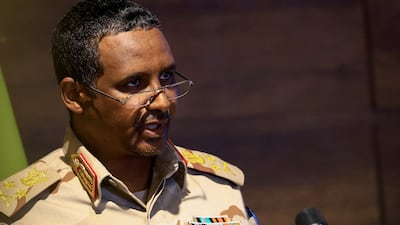The commander of Sudan’s most powerful paramilitary force on Sunday tacitly set conditions for the integration of his men into the armed forces, saying the process must be free of politics and mostly done behind closed doors.
Gen Mohamed Dagalo also emphasised the commitment by his Rapid Support Forces to the country’s democratic transition, saying it is a strategic choice that he and his force will not forsake.
Gen Dagalo was speaking at the launch of talks on Sunday on how to bring the RSF under the army's control as part of far-reaching reform of the military and security forces.
The talks are the final phase in efforts to finalise an agreement for a new transition leading to elections.
The talks between the military and a major pro-democracy coalition — Forces for Freedom and Change FFC — are a follow-up to a preliminary agreement in December between the two sides to restore Sudan’s democratic transition nearly four years after the removal of dictator Omar Al Bashir.
The December agreement provides for a civilian-led government to steer the country for 24 months until elections are held. It also stipulates that the army, which seized power in an October 2021 coup, quits politics.
Already, April 6 and 11 have been set as the dates for the declaration of a new agreement and the establishment of a civilian-led government.
“Military and security reforms are not a political endeavour and must not be subjected to a political agenda," Gen Dagalo told participants at the start of the talks.
"It’s a nationalistic effort linked to the supreme interests of the nation."
Reminding listeners that the RSF was legalised in 2013, he said reform must be accompanied by legislation and be part of comprehensive reforms of all state institutions.
“There is no place for noise, chants and slogans in this complex and sensitive technical process, many of whose parts must be dealt with behind closed doors," Gen Dagalo said.
“The Rapid Support Forces has and will be unequivocally committed to the choice of democratic transition."
He said the RSF refused to join the security forces that tried to crush the anti-Bashir street protests in 2018 and 2019, which forced the army to remove the former dictator in April 2019.
Assimilating the RSF into the armed forces and placing the military and security agencies under civilian oversight have been key demands by the pro-democracy movement.
Its supporters have staged many protests against the military since the 2021 coup.

The proposed RSF integration has been a contentious issue between Gen Dagalo and army chief and coup leader Gen Abdel Fattah Al Burhan.
Gen Dagalo has declared his commitment to the principal of a “single army” but has not unequivocally accepted RSF integration in his public comments.
Gen Al Burhan has said he would not sign off on a political agreement that does not clearly state and give a timeline for the RSF integration in the armed forces.
Tension between the army and the RSF has heightened in recent weeks, prompting troops in the capital Khartoum to go on a high alert.
RSF’s combat-seasoned and well-armed men have been posted across Khartoum since 2019.
Addressing Sunday’s talks, Gen Al Burhan described reforming the military and security agencies as a “long and complicated process” that would not be easy to handle.
“We want to build an armed forces that’s committed to the measures of democratic governments,” he said, pledging that the military would not be an impediment to Sudan’s democratic transition.
Sudan has been ruled by the military for most of the nearly 70 years since independence in 1956, seizing power in coups that toppled freely elected but dysfunctional governments.
Sudan has also been beset by long civil wars in its south and west, draining the country’s resources and deepening its ethnic and religious divides.
The October 25, 2021 coup deepened the country's economic woes, when Sudan's western backers suspended billions of dollars' worth of aid and debt forgiveness.
They say only when a credible democratic transition is restored will they resume helping the vast and underdeveloped nation.
The power grab also created a vacuum in Sudan's outlying areas in the west and south, with ethnic and tribal clashes leaving hundreds dead and tens of thousands displaced.


